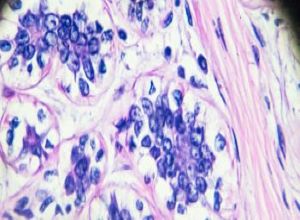|
February 2021 ANTIBODY DRUG IMPROVES SURVIVAL FOR AGGRESSIVE BREAST CANCERFeaturing: William Gradishar, MD
A new antibody drug used in combination with chemotherapy demonstrated similar efficacy to currently available therapies to treat advanced ERBB2-positive breast cancer, according to findings from an international clinical trial published in JAMA Oncology. The drug margetuximab provides another therapeutic option for patients by helping improve overall survival, said William Gradishar, MD, the Betsy Bramsen Professorship of Breast Oncology, chief of Hematology and Oncology in the Department of Medicine and senior author of the study. Breast cancer that is ERBB2-positive, also known as HER2-positive breast cancer, is an aggressive subtype of breast cancer where breast tumors have higher than normal levels of the protein HER2. This protein is located on the outside of breast tumor cells and promotes growth and spread of the disease faster than other types of breast cancer. When such cancers metastasize to other areas in the body, they are considered incurable, but developments in therapies that target HER2 have significantly improved patient survival. Nevertheless, the need for newer and better drugs is an ongoing mission, according to Gradishar. For the current clinical trial, the investigators compared the efficacy of the antibody drug margetuximab with trastuzumab, a HER2 receptor positive antibody drug, in treating patients with ERRB2-positive breast cancer. Both trastuzumab and margetuximab are antibody drugs, meaning they bind to the extracellular domain of HER2 and activate the body’s immune response to tumor cells. What differentiates the two drugs is that margetuximab was engineered to be able to interact with immune cells and certain cell receptors, making the drug more effective in treating specific genotypes that account for the majority of patients, according to Gradishar. Among patients who received margetuximab, the investigators found that overall disease progression was delayed, and overall survival was increased. However, toxicity levels remained similar in both groups. The findings point to margetuximab being used in later lines of therapy and adds to the growing list of therapeutic options for patients. According to Gradishar, other strategies incorporating margetuximab with other agents are being planned. The drug is also currently being studied in preoperative settings to determine whether it can reduce the presence of disease in patients at the time of surgery. “If you can offer patients something else that has promise, even if it’s for a modest amount of time, that’s good for patients,” said Gradishar, who is also a member of the Robert H. Lurie Comprehensive Cancer Center of Northwestern University. This work was supported by MacroGenics, Inc. This article was originally published in the Feinberg School of Medicine News Center on February 4, 2021. |
William Gradishar, MD, the Betsy Bramsen Professorship of Breast Oncology and chief of Hematology and Oncology in the Department of Medicine, was senior author of the study published in JAMA Oncology.
Refer a PatientNorthwestern Medicine welcomes the opportunity to partner with you in caring for your patients.
|
You May Also Like
|
October 2020 |






